九年级人教版英语学习笔记
人教版九年级英语课堂笔记
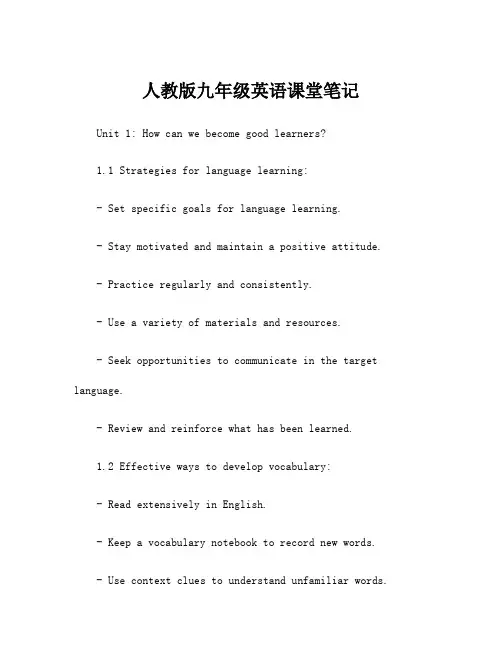
人教版九年级英语课堂笔记Unit 1: How can we become good learners?1.1 Strategies for language learning:- Set specific goals for language learning.- Stay motivated and maintain a positive attitude.- Practice regularly and consistently.- Use a variety of materials and resources.- Seek opportunities to communicate in the target language.- Review and reinforce what has been learned.1.2 Effective ways to develop vocabulary:- Read extensively in English.- Keep a vocabulary notebook to record new words.- Use context clues to understand unfamiliar words.- Use flashcards or online tools for vocabulary practice.- Review and revise vocabulary regularly.- Apply learned words in speaking and writing.1.3 Skills for reading comprehension:- Skim the text to get a general idea.- Scan for specific information.- Pay attention to headings, subheadings, and formatting.- Look for context clues to understand unfamiliar words.- Make predictions and infer meaning from context.- Summarize the main points of the text.1.4 Strategies for listening comprehension:- Pay attention to the speaker's body language and facial expressions.- Focus on keywords and phrases.- Take notes while listening.- Ask questions for clarification.- Practice listening to a variety of accents and speech speeds.- Listen to authentic materials, such as podcasts or videos.1.5 Techniques for effective note-taking:- Use abbreviations and symbols to save time.- Write down key information and main ideas.- Organize information using headings and subheadings.- Use diagrams or mind maps to visualize information.- Review and revise notes after the lecture or class.- Highlight important points or concepts.1.6 Strategies for overcoming difficulties:- Seek help from teachers or classmates when facing challenges.- Break tasks into smaller, manageable parts.- Develop a growth mindset and believe in one's potential.- Practice self-reflection and learn from mistakes.- Find strategies or techniques that work best for individual learning styles.- Stay persistent and persevere through difficult times.Unit 2: Why don't you get her a ticket to the concert?2.1 Making suggestions and offers:- Why don't you...?- How about...?- I suggest...- Would you like me to...?- Do you want...?- Let's...2.2 Expressing preferences:- I prefer...- I'd rather...- I'm more interested in...- I'm not really into...- I'd love to...- I'm not keen on...2.3 Giving and asking for advice: - You should...- It would be a good idea to... - Have you thought about...?- What do you recommend?- What's your opinion on...?- Can you give me any advice on...?2.4 Responding to advice and suggestions:- That's a great idea!- I'll definitely consider it.- I'm not sure about that.- I don't think it's a good option.- Thanks for the suggestion, but I think I'll pass. - I'll think it over and let you know.2.5 Talking about possible outcomes:- If you go to the concert, you'll have a great time. - If you study hard, you'll get good grades.- If it rains, we'll have to stay indoors.- If she misses the bus, she'll be late for school. - If we leave now, we'll catch the train.- If you don't hurry, you'll miss the deadline.2.6 Offering alternatives:- Instead of going to the movie, we could go bowling.- If you don't like pizza, we can order Chinese food.- Rather than taking the bus, you could ride your bike.- If she can't attend the party, we'll invite someone else.- In case of bad weather, we can have the picnic indoors.- If the store is closed, we'll try another one.。
九年级英语人教版unit3笔记
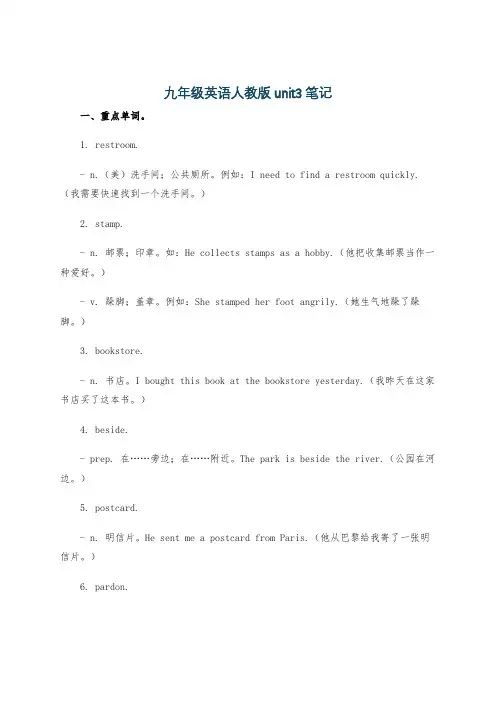
九年级英语人教版unit3笔记一、重点单词。
1. restroom.- n.(美)洗手间;公共厕所。
例如:I need to find a restroom quickly.(我需要快速找到一个洗手间。
)2. stamp.- n. 邮票;印章。
如:He collects stamps as a hobby.(他把收集邮票当作一种爱好。
)- v. 跺脚;盖章。
例如:She stamped her foot angrily.(她生气地跺了跺脚。
)3. bookstore.- n. 书店。
I bought this book at the bookstore yesterday.(我昨天在这家书店买了这本书。
)4. beside.- prep. 在……旁边;在……附近。
The park is beside the river.(公园在河边。
)5. postcard.- n. 明信片。
He sent me a postcard from Paris.(他从巴黎给我寄了一张明信片。
)6. pardon.- v. 原谅;请再说一遍。
Pardon me, I didn't catch your words.(对不起,我没听清你的话。
)- n. 原谅;宽恕。
I beg your pardon for being late.(请原谅我迟到了。
)7. washroom.- n. 洗手间;厕所(同restroom,比较口语化)。
Can you tell me where the washroom is?(你能告诉我洗手间在哪里吗?)8. bathroom.- n. 浴室;洗手间。
There is a bathtub in the bathroom.(浴室里有一个浴缸。
)9. normal.- adj. 正常的;一般的。
It's normal to feel nervous before an exam.(考试前感到紧张是正常的。
人教版九年级英语第一单元笔记
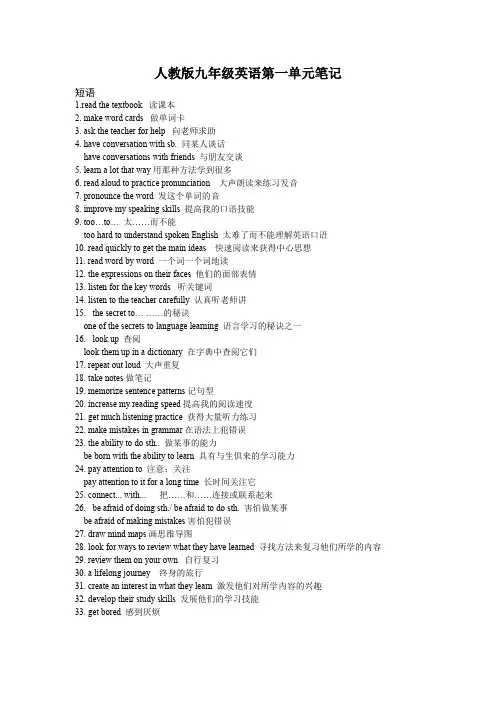
人教版九年级英语第一单元笔记短语1.read the textbook读课本2. make word cards做单词卡3. ask the teacher for help向老师求助4. have conversation with sb. 同某人谈话have conversations with friends 与朋友交谈5.learn a lot that way用那种方法学到很多6.read aloud to practice pronunciation 大声朗读来练习发音7.pronounce the word 发这个单词的音8.improve my speaking skills 提高我的口语技能9.too…to… 太……而不能too hard to understand spoken English 太难了而不能理解英语口语10.read quickly to get the main ideas 快速阅读来获得中心思想11.read word by word 一个词一个词地读12.the expressions on their faces 他们的面部表情13. listen for the key words听关键词14.listen to the teacher carefully 认真听老师讲15.the secret to… ……的秘诀one of the secrets to language learning 语言学习的秘诀之一16.look up 查阅look them up in a dictionary 在字典中查阅它们17.repeat out loud 大声重复18. take notes做笔记19.memorize sentence patterns记句型20.increase my reading speed提高我的阅读速度21. get much listening practice 获得大量听力练习22.make mistakes in grammar在语法上犯错误23.the ability to do sth.. 做某事的能力be born with the ability to learn 具有与生俱来的学习能力24.pay attention to 注意;关注pay attention to it for a long time 长时间关注它25.connect... with... 把……和……连接或联系起来26.be afraid of doing sth./ be afraid to do sth. 害怕做某事be afraid of making mistakes害怕犯错误27. draw mind maps画思维导图28.look for ways to review what they have learned 寻找方法来复习他们所学的内容29. review them on your own自行复习30.a lifelong journey 终身的旅行31.create an interest in what they learn 激发他们对所学内容的兴趣32.develop their study skills 发展他们的学习技能33. get bored 感到厌烦34. be stressed out 表示情绪紧张或精神压力大;表示过度疲劳35. depend on 取决于;依靠36. decide to do sth. 决定做某事37. deal with 处理38. worry about sb./ sth. 担心某人/某事39. be angry with sb. 生某人的气40. go by (时间)过去41.重点句型1. —How do you learn English?你如何学英语?—I learn by studying with a group. 我通过小组学习。
人教版九年级英语单元笔记梳理
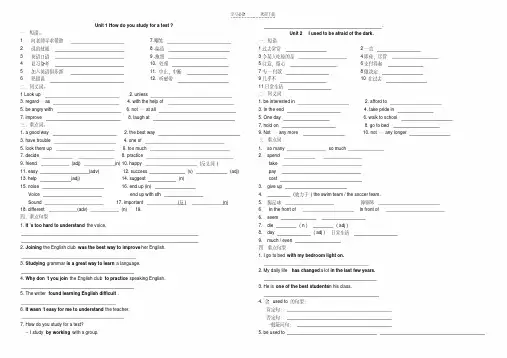
15 足够多的 17 而不是 19 英语演讲比赛
16 和 … 相处 18 立刻,马上 20 名列前茅
21 急救 23 偶然地,意外地
22 出版,发行 24 事实上
25 把 sth 藏起来以免让 sb 看见 二. 同义词
1. Let sb down
2 right away
3 get along with 三. 重点词
4 He might be running to catch a bus.
3 What if I don’t know anyone?
5 My parents called the police, but they can’t find anything strange.
4 I don ’t know what to say or to do.
Prefer =
.
2. a great place
(adj) 4. Italy
(n )
6. agree
.
(否定 )
.
.
. (adj)
(n)
.
8. look for 9. can’t stand
find out 10. clear
(adv)
学习必备
11. would like
12 exhibit
(N)
because of 8 happy 10 forget
Unit5 It must belong to Carla
2 属于 4 编造,构成 6 逃离 8 上车 10 迟到
2 author 4 gift 6 use up
sth (反 )
2 pretend 4 whose 6 try 7 look / feel 9 let / make 11 remember
Unit10笔记人教版英语九年级全册
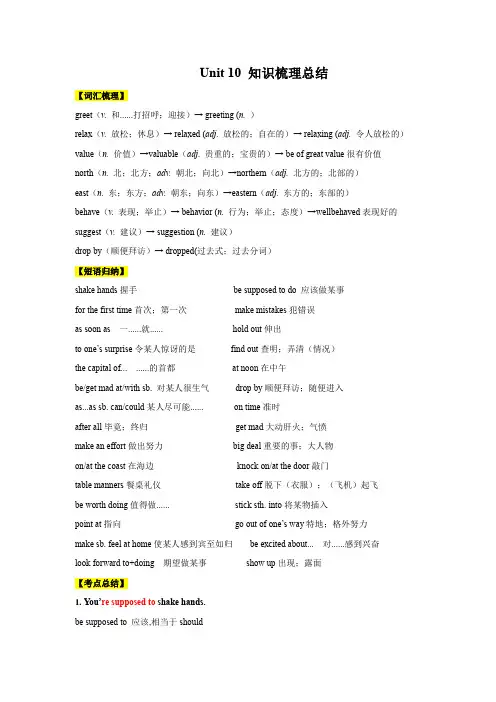
Unit 10 知识梳理总结【词汇梳理】greet(v.和......打招呼;迎接)→ greeting (n. )relax(v.放松;休息)→ relaxed (adj. 放松的;自在的)→ relaxing (adj. 令人放松的)value(n.价值)→valuable(adj.贵重的;宝贵的)→ be of great value很有价值north(n.北;北方;adv.朝北;向北)→northern(adj.北方的;北部的)east(n.东;东方;adv.朝东;向东)→eastern(adj.东方的;东部的)behave(v.表现;举止)→ behavior (n. 行为;举止;态度)→wellbehaved表现好的suggest(v.建议)→ suggestion (n. 建议)drop by(顺便拜访)→ dropped(过去式;过去分词)【短语归纳】shake hands握手be supposed to do 应该做某事for the first time首次;第一次make mistakes犯错误as soon as 一......就...... hold out伸出to one’s surprise令某人惊讶的是find out查明;弄清(情况)the capital of... ......的首都at noon在中午be/get mad at/with sb. 对某人很生气drop by顺便拜访;随便进入as...as sb. can/could某人尽可能...... on time准时after all毕竟;终归get mad大动肝火;气愤make an effort做出努力big deal重要的事;大人物on/at the coast在海边knock on/at the door敲门table manners餐桌礼仪take off脱下(衣服);(飞机)起飞be worth doing值得做...... stick sth. into将某物插入point at指向go out of one’s way特地;格外努力make sb. feel at home使某人感到宾至如归be excited about... 对......感到兴奋look forward to+doing 期望做某事show up出现;露面【考点总结】1.You’re supposed to shake hands.be supposed to 应该,相当于shoulde.g.We are supposed to help each other.=We should help each other.【注】suppose意为“认为;推断”时,其后常接宾语从句,在宾语从句中否定要前移。
人教版九年级英语超级笔记(全一册)
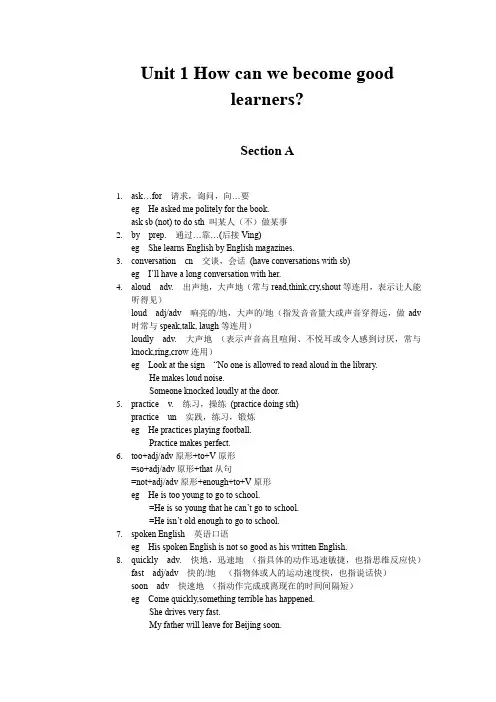
Unit 1 How can we become goodlearners?Section A1.ask…for 请求,询问,向…要eg He asked me politely for the book.ask sb (not) to do sth 叫某人(不)做某事2.by prep. 通过…靠…(后接Ving)eg She learns English by English magazines.3.conversation cn 交谈,会话(have conversations with sb)eg I’ll have a long conversation with her.4.aloud adv. 出声地,大声地(常与read,think,cry,shout等连用,表示让人能听得见)loud adj/adv 响亮的/地,大声的/地(指发音音量大或声音穿得远,做adv 时常与speak,talk, laugh等连用)loudly adv. 大声地(表示声音高且喧闹、不悦耳或令人感到讨厌,常与knock,ring,crow连用)eg Look at the sign---“No one is allowed to read aloud in the library.He makes loud noise.Someone knocked loudly at the door.5.practice v. 练习,操练(practice doing sth)practice un 实践,练习,锻炼eg He practices playing football.Practice makes perfect.6.too+adj/adv原形+to+V原形=so+adj/adv原形+that从句=not+adj/adv原形+enough+to+V原形eg He is too young to go to school.=He is so young that he can’t go to school.=He isn’t old enough to go to school.7.spoken English 英语口语eg His spoken English is not so good as his written English.8.quickly adv. 快地,迅速地(指具体的动作迅速敏捷,也指思维反应快)fast adj/adv 快的/地(指物体或人的运动速度快,也指说话快)soon adv 快速地(指动作完成或离现在的时间间隔短)eg Come quickly,something terrible has happened.She drives very fast.My father will leave for Beijing soon.9.word by word 逐字地day by day 日复一日one by one 逐个10.patient adj 有耐心的,耐烦的(be patient with/to…对…有耐心)n 病人eg We all like Mr.Smith.He is very patient with us.The nurse is looking after the patient.11.not…everything 表示部分否定,could not understand everything “并非每件事都能理解”当every,all,always等表示整体意义的词与not连用时,表示部分否定eg I didn’t find everyone on the playground.Not all balls are round in the USA.12.secret cn 秘密,机密(keep a secret保密;in secret秘密地)adj 秘密的,隐秘的eg Exercising every day is the secret of health.It’s a secret passage.13.look up (在字典或资料中)查找;向上看,仰视eg I’ve forgotten the number,you should look it up again.They looked up,and found many locusts.14.repeat =do or say…again15.take a note/take notes 记笔记16.memorize v 记忆,记住(指有意识地用心地去记,强调主观的动作过程memory nremember v 记得(指某件事或印象在记忆里,一般不需要有意识地去记忆便可以想起)eg She tried to memorize every event.She remembered event that happened in these years.17.be afraid of doing sth 担心而害怕做某事be afraid to do sth 怕而不敢做某事eg The girl was afraid to go across the bridge,for she was afraid of falling downfrom it.Section B1.increase to 增到,增加到(后+总数)eg The population of this city has increased to 3,000,000by now.increase by 以…的幅度增加,增加了…eg The population of this factory increased by 10 percent last year.2.at the speed of 以…速度at top/full/high speed 高速,全速eg Your taxi traveled at the speed of 80 miles an hour.It’s dangerous to turn round the corner at high speed.3.be born 出身于be born with 天生具有…be born to do sth 天生能做某事eg He was born in a small village.Her cousin brother was born with a mole(胎记) on the shoulder.Man was born to cry,so it’s with other animals.4.have the ability to do sth 有能力做某事eg Jenny is the first person for the job,she has the ability to communicate.5.take an interest in=be interested in 对…感兴趣lose interest in 对…失去兴趣eg She seems to take an interest in discussing the trip.He has lost interest in fishing.6.create v 创造,创建,创作creative adj 创造性的,有创意的creation n 创造,创建7.It’s +adj +for sb to do sth 对某人来说做某事是……It’s +adj +of sb to do sth (adj是表示情感,特征的词:kind ,nice ,good ,silly ,wrong ,wise等) eg It’s hard for you to finish it.It’s kind of you to say so.8.pay attention to 注意…留心…(to是介词,后接n/pron/Ving)eg Your spoken English is a little poor.Please pay attention to it.As you see,Sam didn’t pay much attention to watching TV.9.connect…with…把…和…连接起来connect…to…把…连上eg First,the light is connected to a switch.Don’t connect the matter with what happened last week.10.even if =even though即使,纵然eg I wouldn’t give up even if I should fail a second time.I can still remember even though it happened so long ago.11. unless=if…not…如果不,除非eg You’ll be late unless you hurry.=You’ll be late if you don’t hurry.Unit 2 I think mooncakes are delicious!Section A1.a little too 太……一点eg Kevin was a little too young to dress himself.2.put on 增加(体重)发胖+weight穿上,戴上+衣物eg Last month,Joan put on some weight.Mr.Weevers put on his hat and hurried out.3.pound cn 重量单位“磅”.货币单位“英镑”eg two pounds of milkAfter the Sichuan earthquake,the British government gave away1,000,000 pounds. 4.shoot down 击落,击毁eg An US UA V was shot down in Iran last year.5.try to do sth 尽力做某事(但不一定成功).try doing sth 尝试做某事eg She tried to climb onto the bank(河岸),but failed.You always travel by train,why not try taking a bus for a change?6.steal 偷,窃取(stole stolen). steal sth from 从……偷某物eg The child stole a book from the shelf..have sth stolen 某物被偷eg She had her purse(钱包)stolen.7.so……that……如此……以至于…….so+adj/adv+that从句.so+adj+a/an+单数名词+that从句.so+many/few+复数名词+that从句.so+much/little+不可数名词+that从句eg He is so young that he can’t go to school.He made so many mistakes that he failed the exam..such……that……如此……以至于…….such+a/an+单数名词+that从句.such+复数名词/不可数名词+that从句.such+a/an+adj+n+that从句.such+adj+复数名词/不可数名词+that从句eg He is such a good student that we all believe him.It was such bad weather that we had to stay at home.y v 平放,放置(lay out 摆开,布置)产卵,下蛋eg Mrs,Turner laid out the flowerpots in her garden.How strange it is to see the hen lay two eggs a day!lie----lying----lay----lain 躺,位于lie----lying----lied----lied 撒谎lay----laying----laid----laid 平放,产卵9.admire vt 欣赏,观赏(admire sth 欣赏某物)Vt 钦佩,羡慕(admire……for……因……而钦佩……)eg Standing on the top of the mountain,you can admire the beauty of the whole city.We admire Ann for her courage.10.tie cn 领带(a shirt and tie). v 拴,扎,系,绑(tie…to…将…拴到…)eg It’s formal(正式)to wear a shirt and tie if you go to a party.Please tie your dog to the tree.11.感叹句的种类How引导的感叹句(1)How+adj+主语+谓语!(2)How+adv+主语+谓语!(3)How+adj+a/an+单数名词+主语+谓语!(4)How+主语+谓语!eg How blue the sky is!How well she danced that day!How interesting a book it is!How time flies!What引导的感叹句(1)What+a/an+单数名词+主语+谓语!(2)What +不可数名词+主语+谓语!(3)What+复数名词+主语+谓语!(4)What+a/an+adj+单数名词+主语+谓语!(5)What+adj+不可数名词+主语+谓语!(6)What+adj+复数名词+主语+谓语!eg What a horse it is!What fun it was!What colors they are!What a nice girl she is!What fine weather it was last week!What silly questions they are.Section B1.trick cn 恶作剧,闹剧(play a trick on sb 捉弄某人)eg The kids played tricks on Harvey when he was young.2.treat cn 招待,款待v 对待,把…看作(treat…as…把…看作…) eg It’s my treat.Don’t treat his words as a joke.3.dress up as+sb 装扮成某人dress up in+服装或颜色穿上…eg The kids are dressing up as pirates(海盗)Father Christmas often dresses up in red.4.mean adj 小气的,吝啬的,自私的(be mean with…对…吝啬)v 意味着,意欲mean doing sth 意味着做某事mean to do sth 打算做某事not mean to do sth 不是有意做某事eg Mr.Marley was mean with almost everything.That would mean wasting a lot of labor.Really?I don’t mean to waste any labor.I don’t mean to be late ,sir.5. business un 商业,生意.un 职责,事务,事(on business 出差).cn 商铺,商店eg Sometimes,business English is hard to learn.Mr.Wang has gone to Hainan Island on business.She has a business in Paris.5.punish sb for (doing) sth 因为(做)某事而处罚某人eg He was punished for breaking the school rules.6.warn sb of sth 警告某人某事warn sb (not) to do sth 警告某人(不)做某事warn sb +that从句eg We’ve warned the kids of the risk of electricity.We’ve been warned not to go out these days.I warned her that snakes are dangerous.7. end up doing sth 最终成为…结果为…eg I didn’t like it at first,but we ended up cheering.end up with 以…告终eg Their game ended up with a quarrel.7.present un 现在,目前(at present).cn 礼物赠品.adj 现在的,目前的.出席的,到场的eg At present,everything goes well.My uncle sent me an iPad as a birthday present.What do you think of your present company,David?The present guests were all in high spirit.8.spread v/n 传播,蔓延eg The fire spread in a short time.China has successfully controlled the spread of bird flu.(禽流感)9.hiding n 躲藏,隐藏处(in hiding 躲藏着;go into hiding 躲起来)eg Tom and his sister went into hiding when they heard the sound of their mother’s footsteps.10.hunt n 搜索,搜寻(hunt for)eg The hunt for the sunk ship(沉船) continue11.not only…but also…不但…而且…(连接两个相对称的并列成分,若连接两个主语时要实行就近原则)eg Not only Mr.lin bt also his son loves the movies.Unit 3 Could you please tell me wherethe restrooms are?Section Armation un 消息(表示通过打听、学习、观察等方式获得的资料).news un 新闻,消息(指人们感兴趣的或近来发生的事情,尤指通过广播、电视、报纸等事情).message cn 消息,口信(指口头或书信传递给他人的消息)eg We need some information.He often sends me short messages.We listen to the news on the radio.2.Could you please+V原形…….?请你…….好吗?.Could you please not+V原形……? 请你不要……好吗?(其回答中不能用could,只能用can.即Yes,I can.或No/Sorry,I can’teg Could you please be here a little earlier?Sorry,I can’t.3.beside prep 在旁边,在附近=next to/close tobesides prep 除…之外还…eg A girl is standing beside the tree.Dis anyone else come besides Jack?4.get sb sth=get sth for sb(get是“买到,弄到,得到”之意)eg Who’d like to get some chalk for me?=Who’d like to get me some chalk?5.pardon v 原谅(主要用于没听清对方说话时,恳请对方再说一遍).excuse me 打扰一下(主要用于吸引别人的注意,有麻烦或打扰之意所做之事可能会使别人不愉快或不方便,诸如插话、失陪、提出请求、纹路等)eg Can I ask you some questions?Pardon?Excuse me,can you tell me where the bank is?6.need v 需要(实义动词)need to do sth 需要去做某事need doing sth 需要被做某事eg Harold needed to bring drinks.Potatoes need cooking a little longer.7.suggest v 使人想到,使人联想,提议,建议suggest sth (to sb)=suggest (to sb) (向某人)提议/建议…suggest doing sth 提议/建议做某事suggest +that从句(虚拟语气,其谓语用should+动词原形,should常被省略)eg What did you suggest to the manager?I suggested going home at once.I suggest (that) we go out to eat.8. psaa by 经过,路过,从…旁边经过.go by 流逝,过去eg He passed by without greeting me.Time goes by.8.宾语从句(2)类型①连词that引导的宾语从句由陈述句转化而来,that无意义,that可省略eg I think (that) she’ll be back soon.He didn’t know (that) his brother was also there.that在下列情况中不宜省略主句与宾语从句间有插入语eg She said here,in her letter,that she was getting on well with her studies.出现两个或以上的宾语从句,此时只有第一个that可以省略,其余的不能省略eg Danny told me (that) he would go to Canada and that he had been there once.②连词代词who,whom,what,which,whose和when, where,why,how等引导的宾语从句由特殊疑问句转化而来,这些连接代词或连接副词在宾语从句中充当某个成分,因此不能省略。
九年级人教版英语书本笔记unit1
九年级人教版英语书本笔记unit1一、引言九年级人教版英语书本Unit 1主要讲述了学生的日常生活和学校环境,涵盖了各种词汇、语法和表达方式。
本笔记旨在帮助学生们更好地理解和记忆这一单元的知识点,提高英语学习的效率。
二、单词和词组1. morning exercises晨练2. report card成绩单3. homework作业4. gymnastics体操5. chorus唱歌6. electives选修课7. extracurricular activities课外活动8. share one's interests with sb与某人分享兴趣9. play a role in在...发挥作用10. keep up with跟上...三、语法知识1. 动词不定式用法:本单元出现了许多动词不定式短语,如to have to do, to take one's lunch, to share one's notes等,它们在句中作目的语或宾语补足语。
学生们应熟悉这些短语的结构并适当使用。
2. 现在进行时态用法:本单元出现了许多现在进行时态的句子,如"I'm enjoying my time in high school," "She's learning howto play the guitar,"等。
学生们应掌握现在进行时态的结构和用法,了解其在表达情感和计划方面的应用。
3. there be句型用法:本单元出现了许多there be句型,如"There are always lots of students on campus," "There are a lot of interesting activities every week,"等。
学生们应熟悉there be句型的用法,并注意其与have的区别。
Unit3笔记人教版英语九年级全册
Unit 3 知识梳理总结九年级(1)(2)班【词汇梳理】suggest(v.建议;提议)→suggestion (n. 建议)center(n.中心;中央)→central(adj.中心的;中央的)convenient(adj. 方便的;便利的)→convenience(n. 方便;便利)polite(adj.礼貌的)→impolite (adj. 不礼貌的) →politely(adv.礼貌地)→politeness(n.礼貌) direct(adj.直接的;直率的v. 指引;指导)→indirect(反义词,间接的)→directly(adv.直接地)→direction(n.方向;方位)speak(v.说(某种语言))→speaker(n.说某种语言的人;发言者)→spoken(adj.说英语的)correct(adj.正确的;恰当的;v.纠错)→incorrect (adj. 不正确的) →correctly(adv.正确地)【短语归纳】rush to do匆忙做某事in a rush匆忙地excuse me劳驾;打扰go along/walk along/go straight/go down沿着......走turn left向左转go past经过between... and...在......和......之间be excited to do sth.做某事很兴奋at first起初;起先on one’pass by经过on one’s way home在某人回家的路上depend on取决于;靠;依靠lead into导入;引入spend+钱/时间(in)doing sth. 花费时间/钱做某事in different situations在不同的情况下municate with sb. 和某人交流【考点总结】Section A1.Could you please...? 请你.....好吗?此句用于礼貌地提出请求,please后接动词原形,肯定回答:Sure./Certainly./No problem.否定回答:Sorry, I can’t./I’m afraid I can’t.2.Excuse me, could you please tell me how to get to the bookstore?“疑问词+不定式”结构作宾语①how to do e.g. Please tell me how to deal with these old books.②what to do e.g. Could you please tell me what to do next.③when to do e.g. We haven’t decided when to start.3.问路及指路的表达方式.问路:Could you please tell me the way to...?Where is...?Do you know if there is a ... near here?Can you tell me how I can get to...?指路:Go along/Walk alone/Go down the street until...Turn left at the second turning/crossing.4.The bookstore is on your right, beside the bank.beside (prep.) 在......旁边;在.....附近 e.g. The bookstore is beside the mall.besides (prep.) 除.....之外(还)... e.g. We also like chemistry besides physics.5.You don’t need to rush.(1)作动词,意为“仓促;匆忙行事”rush out of冲出rush into 冲进......里(2)作名词,意为“仓促;匆忙”in a rush仓促;匆忙作名词,还可意为“特别忙碌的时期”at the rush hour在(交通)高峰期6.I was scared at first, but shouting did help.在英语中,通常把助动词do/does/did放在动词原形前,用以加强语气,意为“真的;的确”。
九年级人教版英语学习笔记完整版
九年级人教版英语学习笔记Document serial number【NL89WT-NY98YT-NC8CB-NNUUT-NUT108】Unit1Howcanwebecomegoodlearners1、How引导的特殊疑问句:①询问方式或手段:“怎样”如:HowdoyoustudyEnglish?---Istudybyreadingaloud.②用于彼此间打招呼、问候、询问身体状况:如:Howdoyoudo---HowdoyoudoHowareyou---I’mfine/well/Ok.③询问天气或程度:如:How’stheweather=What’stheweatherlike?----It’ssunny/cloudy/raining.④询问年龄:如:Howoldisshe=What’sherage?---Sheis15(yearsold)⑤征求意见或建议用:Howabout=Whatabout+n/代词/V-ing.如:Howabout_______(play)basketball?⑥询问频率用:Howoften如:Howoftendoyouexercise---Onceaday.⑦询问可数名词的数量用:Howmany如:Howmanystudentsarethereinyourclass?---Thereare50studentsinourclass⑧询问不可数名词的数量用:Howmuch.如:Howmuchmeat____(be)thereinthefridge?---Onlyalittle.此外:Howmuch还可以用于询问价格。
Howmuchisyourcoat---It’s50yuan.注:询问价格用:Howmuchis/aresth=What’sthepriceofsth东西有贵(expensive=dear)贱(cheap=inexpensive),价格(price)有高(high)低(low)如:Thiscoatisverycheap. Thepriceofthiscoatisverylow.⑨询问次数用:Howmanytimes“多少次”如:Howmanytimesdoyougototheparkaweek?----Threetimes.⑩询问长度、时间长短用:Howlong如:Howlongistheboat----About3meters.Howlongwillyoustaythere?---For2days注:用Howlong提问,用:For+时间段或since+时间点回答(其中,for可以省略)。
人教版九年级英语笔记整理
人教版九年级英语笔记整理Unit 1: Phrases1.Ask someone for help - to XXXXXX: When we face difficulties。
we should ask the teacher for help.2.XXX - XXXXXX: Listening to tapes is an effective way to XXX.3.Have ns with friends - XXX friendsXXX: We can XXX.4.Give a report - to present n to an audienceXXX: In class。
we may be required to give a report on a chosen topic.5.Spoken English - the use of language in XXX7.Finish doing something - to complete a task or activityXXX: XXX before I go to bed.8.At first - initiallyXXX: At first。
I found it challenging to learn a new language.9.Word by word - one word at a timeXXX: When XXX。
it's important to take it word by word.10.Be patient - XXXXXX: Learning a new language takes time。
so it's XXX.11.Because of - as a result ofXXX: I was afraid to XXX.12.Fall in love with - to XXXXXX: I fell in love with the culture and language of the country I visited.13.Look up - to search for nXXX: I had to look up the meaning of a new word in the nary.14.So that - in order toXXX: I study hard so that I can XXX.15.Take notes - to write down important nXXX: It's helpful to take notes during XXX.16.Learn from - to gain knowledge or XXXXXX: We can learn a lot from XXX.17.Keep a diary - to record daily thoughts and XXXXXX: XXX.18.The secret to - the key to achieving somethingXXX: The secret to learning a new language is consistent practice.19.Make mistakes - to have errors or faultsXXX: It's normal to make mistakes when learning a new language.20.Be born with - to possess a XXXXXX: Some people are born with a talent for music.21.The ability to - the capacity or skill to do somethingXXX: XXX.22.Whether or not - regardless of whetherXXX: XXX.23.Be interested in - to have a XXX somethingXXX: I am XXX.24.Depend on - to rely on or be XXXXXX: XXX.25.In common - shared characteristics or traitsXXX: We have a lot in common with people who share our interests.26.Connect。
- 1、下载文档前请自行甄别文档内容的完整性,平台不提供额外的编辑、内容补充、找答案等附加服务。
- 2、"仅部分预览"的文档,不可在线预览部分如存在完整性等问题,可反馈申请退款(可完整预览的文档不适用该条件!)。
- 3、如文档侵犯您的权益,请联系客服反馈,我们会尽快为您处理(人工客服工作时间:9:00-18:30)。
Unit 1 How can we become good learners?1、How引导的特殊疑问句:①询问方式或手段:“怎样”如:How do you study English?---I study by reading aloud.②用于彼此间打招呼、问候、询问身体状况:如:How do you do?---How do you doHow are you?---I’m fine/ well/ Ok.③询问天气或程度:如:How’s the weather?=What’s the weather like?----It’s sunny/ cloudy/raining.④询问年龄:如:How old is she?=What’s her age?---She is 15 (years old)⑤征求意见或建议用:How about= What about + n/ 代词/ V-ing.如:How about _______(play) basketball?⑥询问频率用:How often如:How often do you exercise?---Once a day.⑦询问可数名词的数量用:How many如:How many students are there in your class? ---There are 50 students in our class⑧询问不可数名词的数量用:How much.如:How much meat ____(be) there in the fridge? ---Only a little.此外:How much还可以用于询问价格。
How much is your coat?---It’s 50 yuan.注:询问价格用:How much is/ are sth? = What’s the price of sth?东西有贵(expensive = dear)贱(cheap = inexpensive),价格(price)有高(high)低(low) 如:This coat is very cheap.The price of this coat is very low.⑨询问次数用:How many times“多少次”如:How many times do you go to the park a week?----Three times.⑩询问长度、时间长短用:How long如:How long is the boat?----About 3 meters.How long will you stay there?---For 2 days注:用How long提问,用:For+时间段或since+时间点回答(其中,for可以省略)。
⑾询问将来时间多久用:How soon如:How soon will you come back?---I’ll be back in ten minutes.注:用How soon提问,用:In+时间段回答。
⑿询问距离远近用:How far “多远”如:How far is it from your home to school?---It’s about 2 kilometers (away)It’s about 10 minutes’ walk/ ride.It’s about 10—minute walk/ ride.2、V + by + V-ing :表示方式,手段。
“靠做…怎么样”如:How do you study English?----I study by __________(listen) to tapes.3、voice, noise, sound的区别:“声音”①voice:主要指人的笑声、歌声、说话声。
强调人的“嗓音”,多指乐音。
如:Her voice sounds very sweet.②noise:指“嗓音”,其形容词是noisy.如:Don’t make so much noise, father is sleeping ③sound:指“物体”的声音”,自然界的一切声音。
如:The sweetest sound in the world is birds’singing.4、too, also, either, as well的区别:①too:用于肯定句,放在句末,且前面有逗号。
如:I like apples, too.②either:用于否定句。
如:I don’t like oranges, either.③also:用于肯定句,放在句中。
置于be动词、助动词、情态动词之后,实义动词之前。
如:I can also swim.I also like pears④as well:用于肯定句,放在句末,但前面没有逗号。
如:I like apples as well.5、little, a little, few, a few的区别:①有a表示肯定,“有”,无a表示否定,“没有”;②little修饰不可数名词,few修饰可数名词。
如:Can you speak English?---Yes, only ____A. littleB. a littleC. fewD. a few6、find的用法:①find sb do sth 发现某人做…(全过程)②find sb doing sth发现某人做…(正在发生)③find + 宾语+adj 发现…怎么样如:He finds watching movies ___ _ _(interest) . 此外:find还有:Sb find it + adj + to do sth “某人发现做…怎么样”(此处it作形式宾语,真正的宾语是动词不定式) 如:I find it easy to study English well.7、-ed型adj和-ing型adj的区别:-ed型形容词修饰人;-ing型形容词修饰物。
如:The __________(excite) news makes us__________(excite)8、疑问词+不定式作宾语如:I don’t know how to do it.I don’t know what to do.注:用how+不定式作宾语时,how后面的动词后面必须有词(间接宾语)如:Can you tell me how to use computer?9、instead和instead of的区别:“代替,相反,而不是”①instead:放在句首或句末。
如:We didn’t go fishing, we went to the park instead.②instead of:放在句中,of是介词,后接名词,代词,动名词。
如:We go to the park instead of going fishing. 10、①watch/see/ hear/ notice/ find sb do sth (强调动作的全过程)②watch/see/ hear/ notice/ find sb doing sth (强调动作正在发生)如:I watched them _____(play) football on the playground this morning.I saw them ______(play) football when I got to school.11、动名词短语作主语,谓语动词用单数。
如:Reading ____(be) interesting for me.Helping others ______(make) me happy. 12、It + be + adj + to do sth 做某事怎么样(It 做形式主语,动词不定式做真正的主语)如:It’s easy ________(study) English well.注:It + be + adj + for/ of sb+ to do sth 对某人来说,做某事怎么样选择for或of的关键是看:adj①若adj修饰人(sb),用of;如:It’s very nice of you to help me.(此句为表示感谢的句子,相当于Thank you,用You’re welcome 或That’s all right 来回答)②若adj修饰物(to do sth),用for如:It’s very important for us to study English well.13、adj修饰名词,adv修adj/ adv/ v如:We should study __________(happy)This is ______(she) book.14、have some trouble / problems/ difficulty (in) doing sth 做某事有困难如:I have some trouble ______(learn) grammar 15、adj和adv的比较级和最高级:比较级:er结尾或more+原形最高级:est结尾或most+原形a. adj/ adv变为比较级和最高级的规则:①一般在adj/ adv词尾加er/ est.②以字母e结尾的加r/ st.③以辅音字母加y结尾的,先变y为i,再加er/ est.如:friendly—friendlier—friendliest④以重读闭音节结尾的,则先双写最后一个字母,再加er/ est.如: hot--hotter—hottest; thin--thinner—thinnest big—bigger---biggest注:什么是重读闭音节:以“一个辅音字母+一个元音字母+一个辅音字母”结尾,且最后两个发音发元音音素和辅音因素的词。
⑤以ly结尾的adv,除了early,加more/ most. 如:slowly---more slowly---most slowly注:early---earlier---earliest⑥多音节或部分双音节词,在前面加more/ most.如:outgoing, beautiful, outgoing, famous, creative注:fun—more fun—most fun①若甲=乙,用“as+原级+as”表示“前者与后者一样”如:Tom is as tall as Jim.②若甲<乙,用“not as/ so+原级+as”表示“前者不如后者”如:This apple is not as/ so big as that one.d. adj/ adv比较级的考点:①出现than用比较级。
